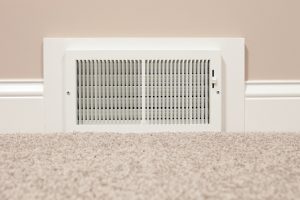 The short answer to this is “yes.” But don’t worry, we’ll elaborate below.
The short answer to this is “yes.” But don’t worry, we’ll elaborate below.
There are many factors that contribute to good indoor air quality. Yes, the temperature of your home is one aspect, but when we talk about indoor air quality, we’re talking about the presence (or absence) of contaminants, allergens, and pollutants, as well as how stale your air may be, and the relative humidity levels in your home. Today we’re going to talk about that last point.
Humidity is the excess moisture that tags along with high summer temperatures. This moisture makes us uncomfortable, for starters. The only way to lower that humidity is to lower the temperature. So, you turn on your AC system and set it to the lowest possible temperature, making it work harder and harder as summer progresses.
Is this really the right way to handle it though? If you worked to improve your indoor air quality by getting a system that handled humidity the right way, could you help your air conditioner out? Yes! Keep reading to learn more.
More on High Humidity
So, when is humidity “too high”? When the relative humidity level in your home is above 50%, that is considered high. A note here—humidity levels can be too low as well—anything under 30% means your air is too dry.
But in the summer months, a relative humidity level above 50% is when most people usually notice discomfort. We stay cool by sweating, and, more specifically, having that sweat evaporate off of our skin.
If the humidity is too high, there’s too much ambient moisture in the air to allow our bodies to sweat. Therefore, we stay heated and sweat stays on our skin, leaving us feeling gross and sticky when the air is muggy. This excess moisture also leads to the development of mold and bacteria, which can make you sick.
What This Means for Your Cooling System
Like we said above, the best way to lower humidity is to lower the temperature, which causes moisture to coalesce into droplets (similar to what you notice outdoors on early mornings). This means your cooling system services as a dehumidifier by default, but that creates a problem.
The problem is, your air conditioner isn’t designed to dehumidify! Yes, it removes some moisture in the air naturally just by operating, but it’s not a significant amount, and you really have no control over how much moisture is actually being removed.
Excessive moisture in the air, in fact, can cause your air conditioner to work harder than it should have to just to do its job. Since the air feels hotter when humidity levels are too high, you might find yourself setting the thermostat lower and lower—which does little for your comfort and just makes the compressor run longer and longer, impacting your air conditioning efficiency, and eventually your cooling bills.
The Dehumidifier Difference
What’s the solution, then? A whole-house dehumidifier!
Over time, high humidity levels can and will shorten the lifespan of your cooling system. But a whole-house dehumidifier is designed to remove the excess moisture from your home, without a negative impact on your air conditioner. In fact, the dehumidifier will actually help your air conditioner, since you won’t need to turn the thermostat down as low and in effect, the AC compressor won’t have to run as long.
Most AC systems do have a drain pan in place to collect condensation. But excess humidity can easily overflow the pan and cause subsequent problems like mold growth or even fire risk, if that moisture reaches electrical components.
A whole-house dehumidifier, used with your air conditioner, will give you precise control over the relative humidity and overall comfort of your home, while helping your cooling system operate more efficiently and effectively.
When you need quality Snellville, GA HVAC and indoor air quality services, look no further than Wall Heating & Air Conditioning, Inc. Contact us today!
